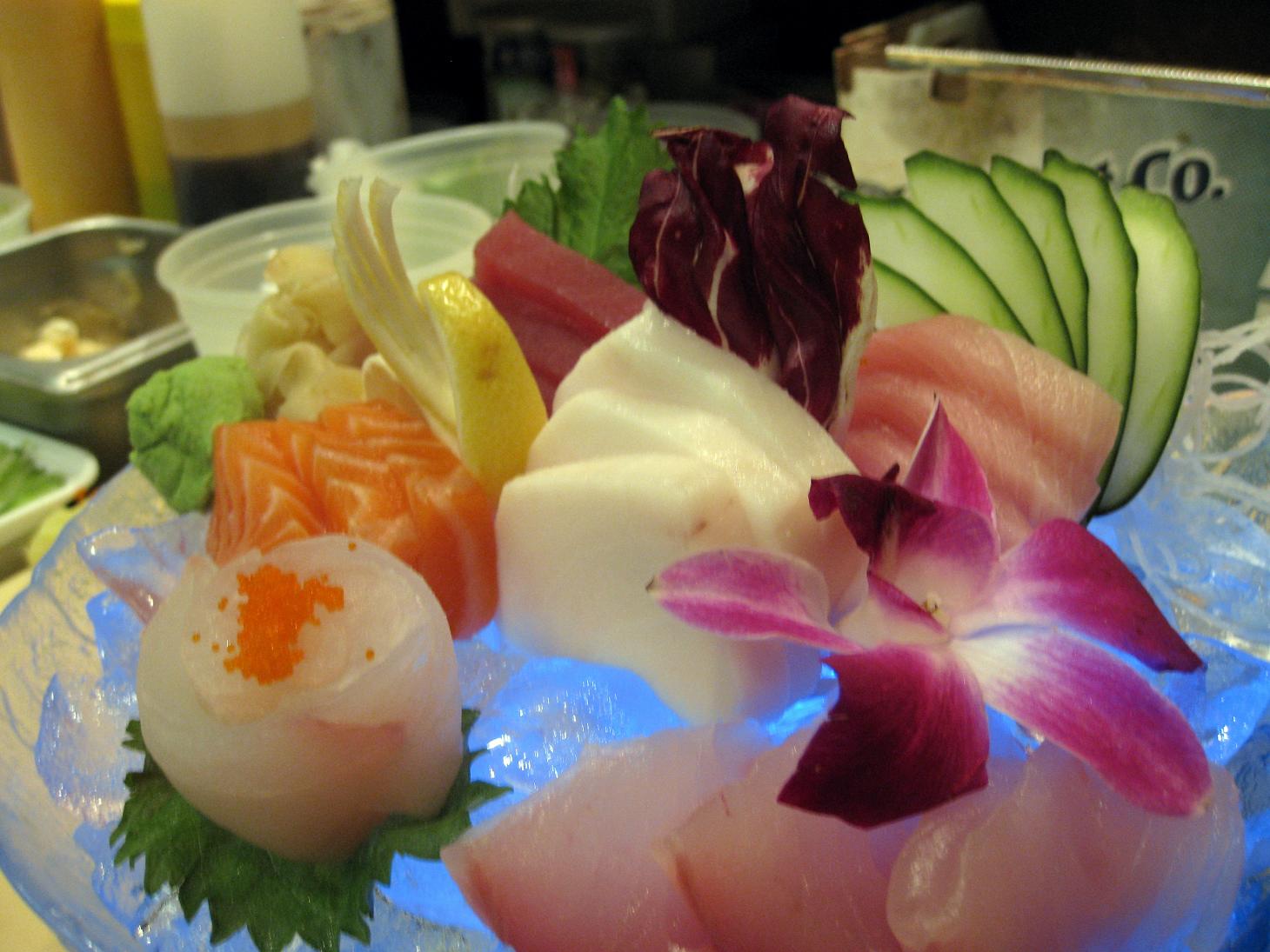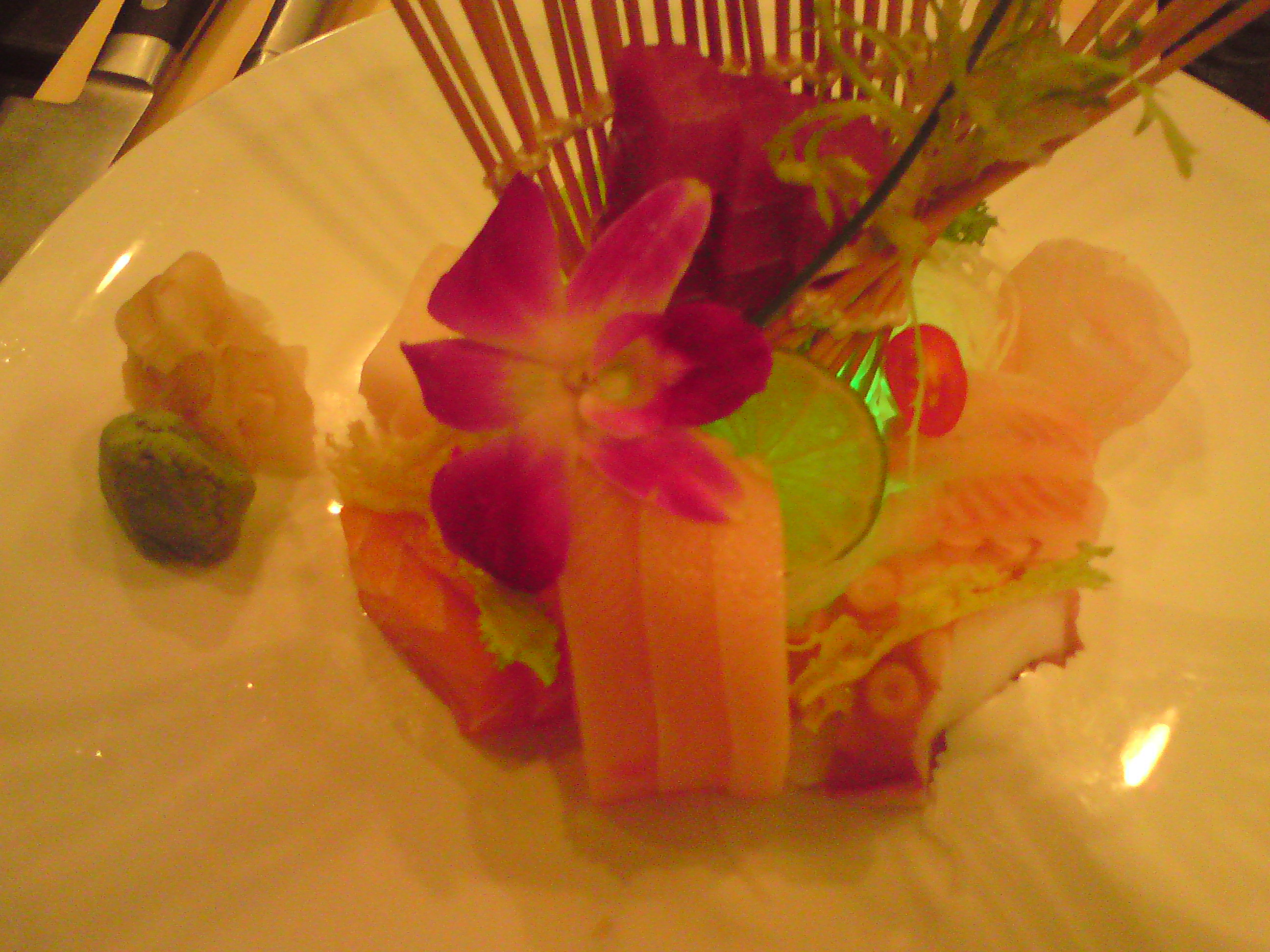He wanted to say something. I could feel it in the air – that tension tingling in the space between us. I put down my tray.
He waited.
I took off the three tall soda glasses, and fit them snugly into one hand. My other hand reached for the soda gun. My thumb fired off two “D’s” and one “P.” Besides the fizzle and pop of carbonation striking soda mix, it was quiet.
He waited.
I handed my patrons their respective refills. When I returned to the bar, I put him out of his misery.
What Martin? I asked him.
“Why you put the plate down like that?” he nodded to the plate of sushi I gave to my guest moments ago. The man – tall, white, with a thick head of black hair – wasn’t cognizant of any problems with the presentation. He already devoured a piece of tuna, and poised pink salmon in his finger tips, glistening from dab of soy sauce.
He continued. “You got to put the plate down the right way.” He stared at me expectantly, as if that sentence alone should clarify his meaning, and any second now, the realization of my committed sin would strike me.
Instead, I stared back at him. I waited for more details. He waited for me to ask for them. He needed the acknowledgement of superior knowledge; I saw it in his posture, that lanky slouch, hip cockeyed and slightly jutted. I saw it in his half-hidden smirk, highlighted by his brown designer glasses and the gentle red highlights in his hair.
I needed not to give him the satisfaction. It was no secret he knew a great deal more about thecuisine than myself. Still, I’d rather stew in my own ignorance than admit defeat, feeding his ego, swelling his pride.
Instead, I spent the following weeks studying the plating of the sushi chefs, especially those who created the more elaborate designs. Picking out the shape and size of their plate was like throwing up a new canvas or striking “Ctrl+N.” They started with clean and white porcelain, and from there, the design was left up to their imaginations. I stared at the pictures they painted, and the landscapes they built, yet I still wasn’t presenting the plate in the correct orientation 100 percent of the time. Finally Danny yelled at me, from behind the sushi bar.
“Look at the ginger-wasabi,” he scolded. “Wasabi should be at their right hand, right? So when they want to take some with their chopstick, very close. Don’t have to go like this,” he demonstrated, making a great show of reaching over an imaginary assortment of fish piled two feet in the air to get to the condiments.
The ginger and wasabi was the North Star of the plating. It was a minor detail at best, but being mindful of the minor details is what people prided themselves on – including Martin.
“Look at this glass,” he said to me once, after we just opened one morning. He picked up the one I just finished wiping down and returned to the shelf. It had two or three water spots, but it was a soda glass; customers would suck carbonation and syrup from the glass, not sip Dom Perignon. It’s fine, I told him. It’s good enough.
“No Chris, not good enough. We keep a certain standard here, okay? You know, all the restaurants in the City, they fire you for this.” He pointed out the door to emphasize his point. “My Godfather would never allow this in his restaurant, so that’s what we have to do.”
Martin held his level of utility as a waiter to the same standards of his cleanliness and knowledge. His pride kept him from accepting help; ask him if he needs a hand while he piles five plates on his arms, and he’ll ignore you. He won’t even respond, other than maybe a short derisive laugh as he brushes past you. When the dinner rush begins and guests are seated, he’ll rush over to get their drink order before you take out your apron and open a fresh page in the notebook.
Then at the end of the night, he’ll beckon you over to the computer. “Look,” he’ll say. He’ll bring up his list of tables for the evening. Two presses on the screen, and it switches to your respective list – which is much shorter. “You’re not working hard enough.”
It took months, but he grudgingly opened up the more we worked together, until finally he confessed,
“See Chris, I do it all for a reason. I need to know who will say, “Oh, let Martin do it,” and who is willing to work. I need to test people, so I know who I can trust.”
He made it sound like going into battle, and the more I worked with Martin, the more I realized that’s exactly how he saw it. Every interaction: from selling sake to plate presentation and banter, it was all more than just work. It was a direct reflection on him, and he took every aspect seriously. While many would look down on serving – regarding the position below their status – he held it in high regard.
He served quickly, smoothly, regardless of how many nooks and crannies he wedged plates into, to create a full-course balancing act. He presented the wasabi, ginger, and protein appropriately, without pause. He identified who would buy higher-end products, and sold it to them with minimum word count. He studied costs of food and beverage, to maximize profit for the business.
At grade schools and Kumbaya-corporate meetings, they use different euphemisms for this behavior. Flying colors, above and beyond, beyond the call of duty, rising to the challenge – anything you could identify with either flying or being under the influence of psychedelic drugs.
But for Martin, it was the price he paid for his pride. It was the cost of wanting – no, needing – to be the best.
Last December, I was driving in Nashville, Tennessee, and a license plate caught my eye: “Liv2Ryd.” It belonged to the rig of a trucker, carrying who knows what across state lines: beets, potatoes, migrant workers. What I couldn’t tell you about the cargo, however, I could tell you about the driver. This wasn’t a person who called the “Truck Driving School” one late, infomercial-saturated night, half-drunk on a case of Natural Ice. This person didn’t come across their position diving through classified ads, desperately searching for something to pay the bills. They did not hate their job.
This person was born and bred for the road. They loved the smell of asphalt during steamy summers, diner food, and conversation over one-more-coffee. Their cargo always arrived on time, whether they were headed to Las Vegas, Nevada or Podunk, NY. They didn’t believe in global position systems; their maps were etched into their minds, not dictated to them by a British voice from their dashboard. Snow, sleet, and flooding weren’t natural disasters or excuses. They were merely obstacles. If needed, they could drive for 48-hours straight, on nothing but some aspirin and a single shot of whiskey. Not all the time; because it was dangerous, and certainly not good for them.
But that was the price of pride. It was the cost of needing to be the best.


